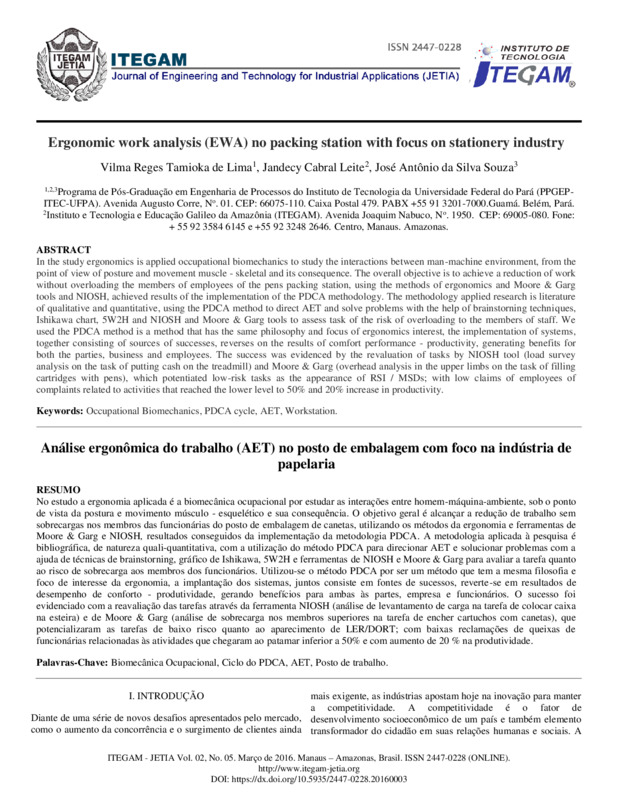Ergonomic work analysis (EWA) no packing station with focus on stationery industry
Item
-
Tipo do ITEM
-
Artigo Ciêntifico
-
Título do Artigo
-
Ergonomic work analysis (EWA) no packing station with focus on stationery industry
-
Descrição
-
In the study ergonomics is applied occupational biomechanics to study the interactions between man-machine environment, from the
point of view of posture and movement muscle - skeletal and its consequence. The overall objective is to achieve a reduction of work
without overloading the members of employees of the pens packing station, using the methods of ergonomics and Moore & Garg
tools and NIOSH, achieved results of the implementation of the PDCA methodology. The methodology applied research is literature
of qualitative and quantitative, using the PDCA method to direct AET and solve problems with the help of brainstorning techniques,
Ishikawa chart, 5W2H and NIOSH and Moore & Garg tools to assess task of the risk of overloading to the members of staff. We
used the PDCA method is a method that has the same philosophy and focus of ergonomics interest, the implementation of systems,
together consisting of sources of successes, reverses on the results of comfort performance - productivity, generating benefits for
both the parties, business and employees. The success was evidenced by the revaluation of tasks by NIOSH tool (load survey
analysis on the task of putting cash on the treadmill) and Moore & Garg (overhead analysis in the upper limbs on the task of filling
cartridges with pens), which potentiated low-risk tasks as the appearance of RSI / MSDs; with low claims of employees of
complaints related to activities that reached the lower level to 50% and 20% increase in productivity.
-
Abstract
-
In the study ergonomics is applied occupational biomechanics to study the interactions between man-machine environment, from the
point of view of posture and movement muscle - skeletal and its consequence. The overall objective is to achieve a reduction of work
without overloading the members of employees of the pens packing station, using the methods of ergonomics and Moore & Garg
tools and NIOSH, achieved results of the implementation of the PDCA methodology. The methodology applied research is literature
of qualitative and quantitative, using the PDCA method to direct AET and solve problems with the help of brainstorning techniques,
Ishikawa chart, 5W2H and NIOSH and Moore & Garg tools to assess task of the risk of overloading to the members of staff. We
used the PDCA method is a method that has the same philosophy and focus of ergonomics interest, the implementation of systems,
together consisting of sources of successes, reverses on the results of comfort performance - productivity, generating benefits for
both the parties, business and employees. The success was evidenced by the revaluation of tasks by NIOSH tool (load survey
analysis on the task of putting cash on the treadmill) and Moore & Garg (overhead analysis in the upper limbs on the task of filling
cartridges with pens), which potentiated low-risk tasks as the appearance of RSI / MSDs; with low claims of employees of
complaints related to activities that reached the lower level to 50% and 20% increase in productivity.
-
Língua do arquivo
-
inglês
-
Data da Publicação
-
Ano 2016
-
Palavra-chave
-
Occupational Biomechanics
-
PDCA cycle
-
AET
-
Workstation
-
Autores
-
Vilma Reges Tamioka de Lima
-
Jandecy Cabral Leite
-
José Antônio da Silva Souza
-
Local
-
UFPA - Belém, 2016


